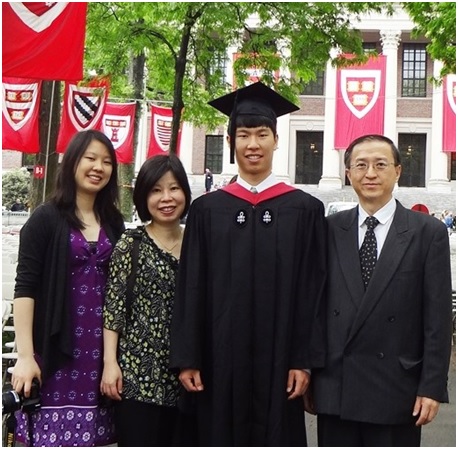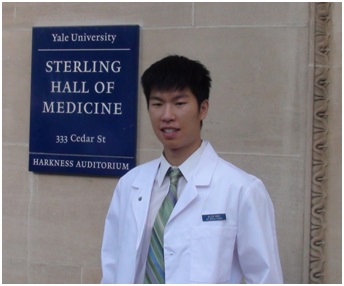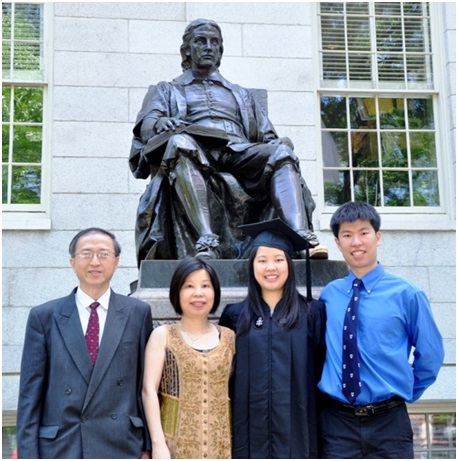College Can Shape Your Life –So Pick One Best Suited for You
By Allen Shih
at Harvard University, 2012
Refresh. Refresh. Refresh. I sat with my eyes fixated on the screen as I waited for an email to appear magically in my inbox. It was March 31, 2009 – the day that college acceptances were being announced through email.
I was nervous as I waited for the email that would dictate my future. The time lengthened as seconds turned into minutes and minutes into hours. Suddenly, an email popped up on the computer screen. The title read “Harvard Application.”
The college admissions process can be a stressful time, not only for students but for parents as well. In a rush to take the SATs and maintain a high GPA, many teenagers are busy from early morning until late at night. They work obsessively to try to get accepted into one of the top universities. But how do you know what college is right for you, and how can you make the most out of your college experience?
Explore Before You Choose
When choosing a college, you should keep in mind a couple of factors. Particularly, you should attempt to visit the schools you are considering, especially the ones to which you have been accepted, in order to experience the school firsthand. You should explore various student clubs to see what activities they do.
Talking to students at the colleges you visit is extremely valuable, because they know what the school is like better than any magazine, book, or advisor. Find out what students enjoy and don’t enjoy about classes. The degree to which they are friendly and approachable will also be a good indicator of what your classmates will be like next year.
Does It Fit Your Future?
The type of academic programs offered by the college is an important factor for landing jobs, internships, and acceptances to graduate schools. Generally, you want to select a college where the professors are accessible and the classes are well suited to your future plans. You should ask about the curriculum requirements and career-related opportunities.
The type of school can also be very important. Liberal arts schools like Harvard University tend to offer a wide range of classes across many disciplines. They cater to your intellectual curiosity and allow you to broaden your perspectives. Other types of schools, such as technical institutes and pre-professional schools, focus strongly on a few areas of study, and are not as flexible in allowing for degree changes.
Is Research Important?
If you are thinking about economics or the sciences, you should ask about the availability of research positions. For example, are there research laboratories at the school? Does the school have a graduate school in which you can have cross-enrollment?
The academic advising system may be vastly different from college to college. Such academic support can be extremely valuable in helping navigate a school’s academic rules and restrictions.
Set Realistic Goals
Lastly, it is important to set realistic goals. While it may be great to go to the best-ranked college, the distinctive atmosphere of a particular school may make it a better fit for you than a school that is better on paper.
This leads to a more general point. Some things in life are outside of your control, and there will be times when you fail. At Harvard, there is a saying that, “half of the incoming Harvard students will be in the lower fifty percent of the freshman class.” Regardless of where you go, there will be competition, but also numerous opportunities.
Be Open to New Ideas
College is a time in which you learn about yourself. You are constantly put in new situations every single day. It is important to be open to new ideas and activities. Sometimes a few diversions can put your personal boundaries into perspective and allow you to better explore yourself. You may come to really love a new activity that you had never thought about before.
Before I first came to Harvard, I was intrigued and a bit intimidated by the thought that everyone would all be extremely talented. I wondered what it would be like to attend school in such an environment. During the first few days of my freshman year, I got to know some of my 1,600 new classmates.
Almost everyone was approachable and friendly, and after a few weeks, it no longer felt strange, but simply as if I was going to college. Joining various clubs and activities helped me meet more people and feel more connected to the school, such as the Taiwanese Cultural Society, Club Tennis, and Intramural Sports.
Sleep, Socialize, and Study
In college, most of your time will be spent sleeping, socializing, and studying. While you will definitely do all three, the ratio between these activities may be very different depending on your major.
For example, one of my roommates who was doing bioengineering his freshman year studied a lot, which left little time for socializing. One of my other roommates, on the other hand, tended to socialize frequently and enjoyed European techno parties. He also kept on top of his work, which meant that he rarely slept. Overall, balancing your college experience should be a priority. You should socialize, sleep, and study, and it will be a challenge to manage all three.
Be Self-Motivated
Even more challenging is maintaining your self-motivation. No one is going to push you on a daily basis in college, not your parents and not your teachers. You will need to take the initiative of knowing when to get help, advice, and mentorship. Advisors will not actively contact you. One of my roommates, who never needed help from teachers in high school, soon realized that the problem sets in college were far more difficult, and had to seek out professors to help tackle some questions.
One tip that I have found helpful is to maintain a routine and have things that are consistent across time. Whenever I am in the middle of finals period or in the beginning of semester, I feel a sense of steadfastness, which is truly calming and beneficial.
Note to Parents
In Asian culture, parents tend to occupy a very engaged role in their children’s education. Probably up to high school, you have made the majority of decisions for your son or daughter regarding applications and test-taking preparations. However, it is critical to realize that college is a unique time for your children to grow and take responsibility. They are in the process of developing into independent, full-fledged members of society.
You should allow your kids to choose what they want, because ultimately your kids will be much happier pursuing their passions. This does not mean that you let go of all contact. Rather, you should maintain communication and help to advise them as one who has more experience in life. Then, your children can make the final decision and understand that they will be responsible for their choices.
The Backfire Effect
At Harvard, I have come across many overbearing parents. Some of my friends have parents that decide all aspects including their career path and relationships. Personally, I feel that such actions inevitably backfire. Many of my classmates who were worked hardest in high school by their parents ended up hiding many things from them in college, and participated in many troublesome acts.
While this may be an extreme example, being the ultimate decision-maker is a very powerful and liberating force. Your children need to be able to fend on their own. Through this, they will become a well-rounded and independent adult capable to making decisions.
Closing Thoughts
I clicked on the “Harvard Application” in my email inbox. The moment I had to wait for the email to load was an eternity. It was the moment I had been waiting for over half a year. I was elated when I found out.
I have been very satisfied with my experience at Harvard University. I have come to meet many famous professors, profound intellectual thinkers, and visionary leaders. I have also come to have a group of friends that I can depend on.
College definitely has its stresses, but you should make the best of every opportunity given to you. Take some risks and explore the world, because you may never have another chance.
下文是中文翻譯:
2009年3月31日晚上,我坐在電腦桌前緊盯螢幕,手中緊握滑鼠不斷刷新,等待郵箱出現大學放榜的通知信函。這封信將左右我未來幾年的生活,隨著時間一分一秒的過去,我感到緊張又焦躁。突然間,一封新電郵躍入眼簾,標題為「哈佛申請結果」。
對學生與家長而言,申請大學可能是一生中最感壓力的一段時間。許多高中生在準備SAT考試的同時,又要爭取高分GPA,每天忙到深夜才能休息。而他們的唯一目標,就是申請進入一所頂尖大學。不少學生為提高申請競爭力,除了維持一定學業成績外,還花時間練習樂器、投入體育與多項社區服務活動。
如今我已即將升上大四,進哈佛卻像只是不久前的事。我成長於紐澤西州,就讀於Delbarton High School。高中時期,我參加數學與科學等學術性社團,同時也積極參與學校網球與游泳隊,並在學校樂團擔任鋼琴與小提琴手角色。
進入哈佛前,我預期哈佛學生都非常厲害,這令我有點憂心,但也很好奇在這樣的環境中學習是什麼情況。大一學期開始的頭幾天,我認識同屆約1600名新生中的幾位同學,他們都很平易近人,也表現的十分友善。幾週後,我逐漸適應哈佛生活,正式迎接大學生涯。透過學校社團與活動,我結識更多好友,也藉由參加台灣文化社(Taiwanese Cultural Society)、網球社團與運動聯盟(Intramural Sports)等,對哈佛產生更多認同感。
今年最廣為人知的哈佛校友應為台裔美籍的NBA球星林書豪,他在紐約尼克隊的亮眼表現遠近馳名。我僅在哈佛校園見過他幾次,多數是在哈佛籃球比賽中為他加油。我曾在大一時參加亞裔基督徒團體(Asian American Christian Fellowship),後來聽說林書豪也是其中活躍份子。
我認為,高中生擇校必須考量幾項要素,特別重要的是,應實地參觀有意就讀或甚至已獲錄取的大學。參觀學校時可打聽校內提供哪些社團活動,看看學生們在社團中都做些什麼。若有機會,可主動跟校內學生攀談,相較於任何雜誌、書籍或甚至升學顧問,他們更瞭解該校的實際情況。他們的表現是否友善或平易近人,亦可作為你期望未來同學的重要指標。對許多人而言,學校離住家的距離也是重要考量之一。
一所大學的學術地位,對畢業生尋找全職或實習工作,甚至申請研究所都至關緊要。校內教授是否提供足夠的辦公室時間,及科系是否符合未來生涯規劃,都是擇校需考量的重要因素。學生應詢問選課標準,及提供哪些職涯相關的機會。學校的類型也可能透露重要信息,譬如哈佛大學等以文科(liberal arts)為主的學校,通常針對各類科系提供大量且廣泛的選修課程。其他如科技學院或職訓學校等選修課程較少,且轉系較不容易。個人若有意攻讀經濟或科學方面的學位,首先應調查學校是否提供研究助理等職缺,譬如校內是否設有研究室?是否有相關研究所?確定大學提供的課程安排合乎需求,接下來可調查校內學生對各種課程的意見。各所大學的選課諮詢系統不同,好的系統能協助學生有效選修所需課程,並幫助他們瞭解選課相關規定與限制。
此外,申請大學時應避免不切實際。能獲一流大學錄取固然是美夢成真,但不見得每人都適合就讀長春藤大學,有時一般大學更能激發個人潛力。我的體認是,人生道路上總有失敗機會,努力也不見得一定達標。世界上跟你差不多或甚至比你更聰明的大有人在。哈佛中有一句名言,「半數新生將在班級中墊底」。我認為這表示,不論你最終進入哪所大學,都同時存在競爭與機會
大學時期也是認識自我的最好機會,面對每天遭遇的不同挑戰,唯有敞開心胸才能做出最佳應變。有時試著接受新事物,可能會發現以往不曾考慮的選項,其實與自己相當合拍。就讀大學期間,我曾多次遭遇極大壓力,但同時也享受許多樂趣,這些經歷幫助我成長,蛻變為更成熟的人。特別是身處一所大規模的院校,個人擁有更多機會透過各類活動與互動,找到自我的定位。
大學生的時間不外乎花在睡覺、社交與讀書上,但分配比例會視主修有所不同:我有室友在大一主修生物工程,幾乎把所有時間拿來讀書,但隨著課程內容愈來愈難,他也開始把握辦公室時間與教授討論;另一位室友成績也很好,但他同時花時間社交與跑趴,我幾乎從未在晚上見他在寢室睡覺。
整體而言,大學首要之務應該是在有限時間中尋求平衡。更具挑戰性的是不斷維持往前的動力。因為大學跟初、高中不同,沒有人在後頭推著你往前跑,你必須主動尋求協助、意見與前輩指導,且瞭解自己喜歡做的到底是哪方面的事情。我的經驗是,隨時維持一貫的生活習慣,這使我不論是在學期初或面臨期末壓力,都能應付自如。
在華人傳統文化中,父母在子女各個教育階段扮演重要角色,但大學是一個人學習成長與培養責任心的關鍵時期,他們在過程中逐漸成為社會的一份子。父母應放手讓子女選擇他們心之所嚮,才能活的更快樂。不過,這並不表示父母無須關心子女動向,相反的,應與子女經常溝通,在他們面臨困難時提供意見,但最後仍尊重子女的選擇,並瞭解他們將為自己的決定負全責。
在哈佛,我見識過部分專橫的父母,不但為他們安排未來職涯規劃,還限制交友圈。從經驗看來,這些高壓手段往往造成反效果。我有許多同學在高中時被迫唸書,如今進入哈佛後卻與父母漸行漸遠,對父母隱藏各種訊息,甚至捲入非法行為。這可能是比較極端的例子,但子女必須學習自己做決定,並承擔相關後果,唯有經歷這段過程,他們才會成為面面俱到、獨立成熟的成年人。
我最終點擊郵箱中標明「哈佛申請結果」的電郵,電郵展開的過程像是一世紀長,而這刻我已等了超過半年。得知錄取結果的當下我興高采烈。三年來在哈佛就讀我非常滿意,我有機會認識許多知名教授、具影響力的思想家,及有前瞻性的領導人物。更有機會選修許多有挑戰性的課程,也很幸運的結識一群好友。課業之餘我參與不少有趣的體育活動,也跑遍波士頓各區。大學求學免不了壓力,但仍應把握每個眼前機會,盡力做到最好。有時不妨承擔些風險,探索世界上的各種可能性,因為錯過這次,你可能再沒機會。大學生涯不只是充滿了各種第一次,讓人疏忽的是其中也充滿許多的唯一一次,希望大家不要到許久以後才明白自己錯過了多少的唯一一次吧!
施亞倫2012年寫於美國哈佛大學
 Allen Shih(施亞倫)於二○一三年哈佛大學畢業典禮,榮獲學士和碩士雙學位
Allen Shih(施亞倫)於二○一三年哈佛大學畢業典禮,榮獲學士和碩士雙學位
 Allen Shih(施亞倫)於二○一三年進入耶魯大學醫學院攻讀醫學學位
Allen Shih(施亞倫)於二○一三年進入耶魯大學醫學院攻讀醫學學位
 Allen Shih(施亞倫)於二○一五年參加妹妹Jenny Shih(施亞婷)的哈佛大學畢業典禮,她的畢業論文獲頒Harvard Stem Cell Institute的最優秀論文獎
Allen Shih(施亞倫)於二○一五年參加妹妹Jenny Shih(施亞婷)的哈佛大學畢業典禮,她的畢業論文獲頒Harvard Stem Cell Institute的最優秀論文獎
Source from Prof. Frank Y. Shih 02/2018
Posted in 02/2018





